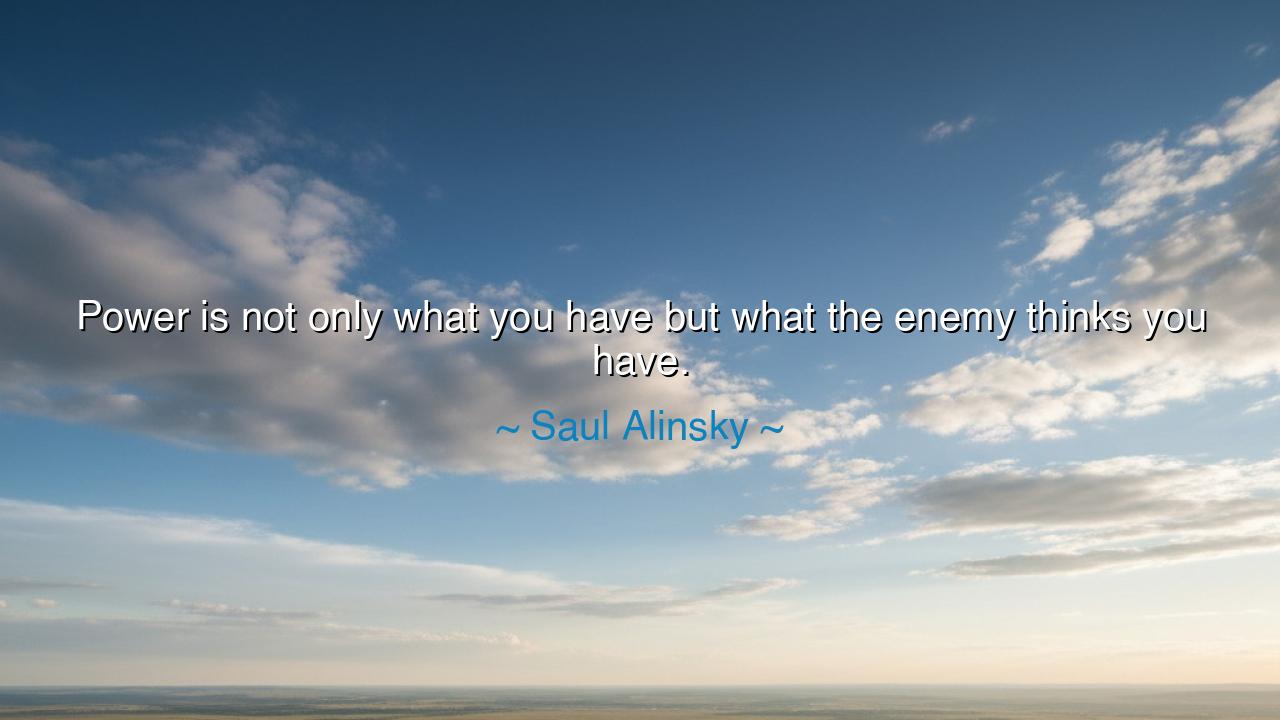
Power is not only what you have but what the enemy thinks you






Saul Alinsky’s words strike like iron upon the anvil of history: power is not only the strength one truly holds in hand, but also the belief—or the fear—that burns in the mind of the adversary. The warrior may wield only a small blade, but if the foe trembles as though he faced a thousand spears, then the warrior commands more than mere steel—he commands perception itself. Thus, power dwells not only in weapons or numbers, but in the shadows they cast upon the hearts of others.
The ancients knew this truth well. In the deserts of Arabia, the armies of Khalid ibn al-Walid, though outnumbered many times, spread dust clouds with their horses to appear vast beyond measure. The enemy, beholding this phantom host, faltered before the first sword was drawn. Here lies the essence of Alinsky’s teaching: that the imagination of one’s enemy can become a greater battlefield than any plain of earth, and that victory often begins in the mind before it is sealed in blood.
We see this lesson again in the tale of the American Revolution. The ragged Continental Army, lacking supplies and often on the brink of despair, kept alive the illusion of greater strength. Washington lit campfires across miles of empty land, making his forces appear endless in the night. The British generals, cautious and deceived, hesitated. Thus, through the art of perception, the weaker hand gained the strength to endure. The Revolution reminds us that what the enemy thinks you have can be as mighty as what truly lies within your grasp.
This teaching is both weapon and warning. For just as perception may magnify the humble, so too can it unmask the mighty. A ruler who seems invincible may crumble when men realize his armies are tired, his coffers are bare, and his spirit is hollow. To wield power wisely, therefore, is not only to cultivate strength, but to guard the image of strength, to cloak weakness, and to shape the vision that others behold.
So let this wisdom be handed down: never measure power by sight alone, for it is woven of both substance and shadow. He who commands the imagination of his foe commands the field. He who shapes perception holds the keys not only to victory, but to the very destiny of nations.






DLDung Le
It’s interesting how this view turns power into a kind of psychological warfare. The enemy’s fear or uncertainty becomes your greatest asset. But it raises an important question — does maintaining that illusion require constant pressure and strategy? And at what point does perceived power start to backfire, especially when reality catches up? It feels like walking a tightrope between control and exposure.
HHoa
This perspective makes me think about the power dynamics in everyday life. Even without wealth or status, people can gain influence by shaping how others see them. It’s empowering, but also dangerous — perception can create both leaders and tyrants. Do you think in the digital age, where social media amplifies image over truth, this idea has become even more relevant?
Ttrang
Alinsky’s words remind me that power is deeply tied to narrative. Control the story, and you control how others act. It’s why propaganda, branding, and public image matter so much in modern society. Still, I wonder whether relying on perception is sustainable. What happens when people realize the power you claim isn’t actually there — does it all collapse overnight?
VANguyen Van A
I find this statement fascinating because it captures the psychological nature of power. If your opponent believes you’re stronger, smarter, or more connected than you really are, they might act accordingly — giving you real leverage. But doesn’t this also imply that manipulation or deception plays a role in leadership? Is that ethical, or just part of the reality of human competition?
VAVu Anh
This quote reveals something profound about perception and influence. It’s not just about what resources or authority you possess, but about how others perceive your strength. In politics, business, or even personal relationships, perception often becomes reality. It makes me wonder — how much of power in today’s world is rooted in illusion rather than substance? Are we ruled more by appearances than by actual capability?